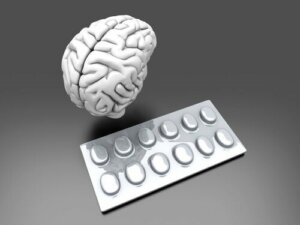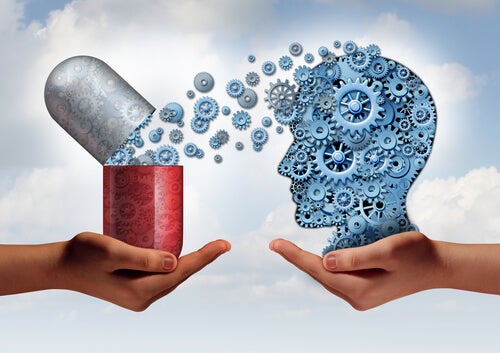How Antidepressants Work

Antidepressants work by triggering physiological changes, which improve your mood. The chemical action of the drugs cause the changes, and their duration is limited. These drugs also cause side effects that scientists still don’t fully understand.
These days, depression is practically a global epidemic. The numbers increase year after year, and we know that not everyone who has depression actually reports it. The numbers also show an increase in depression medication use all over the world. That’s why it’s so important to understand how antidepressants work on the brain.
It’s important to note that pills aren’t the only way to treat the problem. An antidepressant can help regulate the disorder’s symptoms, but it doesn’t get rid of them entirely. In other words, it can push your symptoms to the background, but they’re still there. That’s why we have treatments that exclusively focus on the psychological aspect of depression, and alternative treatments such as psychoanalysis or meditation.
“I was so scared to give up depression, fearing that somehow the worst part of me was actually all of me.”
-Elizabeth Wurtzel-
What does an antidepressant do to the brain?
The term “antidepressant” includes a wide range of medications. We have classic tricyclic antidepressants, selective serotonin reuptake inhibitors (SSRIs), and serotonin-norepinephrine reuptake inhibitors (SNRIs).

Let’s take a closer look at each one:
- Classic tricyclic antidepressants. These are the most traditional and are made of a seven-membered ring with one nitrogen atom. They stimulate the production of serotonin but don’t inhibit its reuptake. This kind of antidepressant has a lot of side-effects.
- SSRIs. These increase serotonin levels and prevent it from being reabsorbed by the body. They’re supposed to be safer than the classic antidepressant. However, scientists have raised a lot of questions about the safety of Prozac, one of the most iconic brands.
- SNRIs. Experts believe that these are the most effective kind of antidepressants. One of the advantages is that they don’t make you tired. Nevertheless, the way these antidepressants work on the brain means that they can cause tremors, appetite changes, and other symptoms.
Most scientists believe that antidepressants don’t cause physical addiction. However, they may be psychologically addictive. Several studies show that this kind of medication can be pretty damaging, especially if taken over more than five years. A responsible psychiatrist will prescribe medication as a temporary fix, not something that the patient should use for life.
Alternative approaches to depression
Antidepressants work by helping patients achieve a relatively stable mood. However, they don’t resolve the root cause of the problem. It’s possible to overcome depression, but not with medication by itself. The conventional treatment for this kind of disorder insists on psychotherapy in addition to pharmaceutical intervention. When used in tandem, these strategies can help patients recover.
Pharmaceuticals, as we mentioned above, are like a band-aid. They moderate the symptoms and make psychotherapy possible. But humans aren’t just physical beings, we’re also symbolic beings.
That means that our neurotransmitters determine our mood, but they aren’t the only factor. The way we interpret and give meaning to our experiences is also vitally important. No capsule or pill can give meaning to your life. The only way to do that is through processes that allow you to reinterpret and build new meaning.

Alternative approaches
Now, from a psychoanalytic point of view, depression isn’t a clinical entity in and of itself. It has more to do with the way that you deal with a particular reality. Jacques Lacan spoke of depression as a manifestation of “moral cowardice”. It’s the idea of “giving in to desire”, or not reaffirming the self. A person with depression doesn’t take on full responsibility for their life and actions, which leads to depression.
Subscribers to Eastern philosophies believe that depression is the fruit of excessive attachment. The emphasis is placed on something external, the same thing you depend on. This dependence leads to fear and denial about the transitory nature of our existence. This is another one of the possible explanations for depression.
Some studies argue that psychotherapy, psychoanalysis, and meditation can have effects similar to those of medication. The action of an antidepressant on the brain is almost immediate and short-lived. Psychotherapy requires more effort on the part of the patient and is a much longer process. The positive side of that, of course, is that it doesn’t have negative side effects, helps patients gain control of their lives, and addresses the root cause of the problem.
Antidepressants work by triggering physiological changes, which improve your mood. The chemical action of the drugs cause the changes, and their duration is limited. These drugs also cause side effects that scientists still don’t fully understand.
These days, depression is practically a global epidemic. The numbers increase year after year, and we know that not everyone who has depression actually reports it. The numbers also show an increase in depression medication use all over the world. That’s why it’s so important to understand how antidepressants work on the brain.
It’s important to note that pills aren’t the only way to treat the problem. An antidepressant can help regulate the disorder’s symptoms, but it doesn’t get rid of them entirely. In other words, it can push your symptoms to the background, but they’re still there. That’s why we have treatments that exclusively focus on the psychological aspect of depression, and alternative treatments such as psychoanalysis or meditation.
“I was so scared to give up depression, fearing that somehow the worst part of me was actually all of me.”
-Elizabeth Wurtzel-
What does an antidepressant do to the brain?
The term “antidepressant” includes a wide range of medications. We have classic tricyclic antidepressants, selective serotonin reuptake inhibitors (SSRIs), and serotonin-norepinephrine reuptake inhibitors (SNRIs).

Let’s take a closer look at each one:
- Classic tricyclic antidepressants. These are the most traditional and are made of a seven-membered ring with one nitrogen atom. They stimulate the production of serotonin but don’t inhibit its reuptake. This kind of antidepressant has a lot of side-effects.
- SSRIs. These increase serotonin levels and prevent it from being reabsorbed by the body. They’re supposed to be safer than the classic antidepressant. However, scientists have raised a lot of questions about the safety of Prozac, one of the most iconic brands.
- SNRIs. Experts believe that these are the most effective kind of antidepressants. One of the advantages is that they don’t make you tired. Nevertheless, the way these antidepressants work on the brain means that they can cause tremors, appetite changes, and other symptoms.
Most scientists believe that antidepressants don’t cause physical addiction. However, they may be psychologically addictive. Several studies show that this kind of medication can be pretty damaging, especially if taken over more than five years. A responsible psychiatrist will prescribe medication as a temporary fix, not something that the patient should use for life.
Alternative approaches to depression
Antidepressants work by helping patients achieve a relatively stable mood. However, they don’t resolve the root cause of the problem. It’s possible to overcome depression, but not with medication by itself. The conventional treatment for this kind of disorder insists on psychotherapy in addition to pharmaceutical intervention. When used in tandem, these strategies can help patients recover.
Pharmaceuticals, as we mentioned above, are like a band-aid. They moderate the symptoms and make psychotherapy possible. But humans aren’t just physical beings, we’re also symbolic beings.
That means that our neurotransmitters determine our mood, but they aren’t the only factor. The way we interpret and give meaning to our experiences is also vitally important. No capsule or pill can give meaning to your life. The only way to do that is through processes that allow you to reinterpret and build new meaning.

Alternative approaches
Now, from a psychoanalytic point of view, depression isn’t a clinical entity in and of itself. It has more to do with the way that you deal with a particular reality. Jacques Lacan spoke of depression as a manifestation of “moral cowardice”. It’s the idea of “giving in to desire”, or not reaffirming the self. A person with depression doesn’t take on full responsibility for their life and actions, which leads to depression.
Subscribers to Eastern philosophies believe that depression is the fruit of excessive attachment. The emphasis is placed on something external, the same thing you depend on. This dependence leads to fear and denial about the transitory nature of our existence. This is another one of the possible explanations for depression.
Some studies argue that psychotherapy, psychoanalysis, and meditation can have effects similar to those of medication. The action of an antidepressant on the brain is almost immediate and short-lived. Psychotherapy requires more effort on the part of the patient and is a much longer process. The positive side of that, of course, is that it doesn’t have negative side effects, helps patients gain control of their lives, and addresses the root cause of the problem.
All cited sources were thoroughly reviewed by our team to ensure their quality, reliability, currency, and validity. The bibliography of this article was considered reliable and of academic or scientific accuracy.
- Del Río, J. (2004). Fármacos antidepresivos y antimaníacos. Florez J (Director). Farmacología Humana. Masson, Barcelona.
This text is provided for informational purposes only and does not replace consultation with a professional. If in doubt, consult your specialist.







